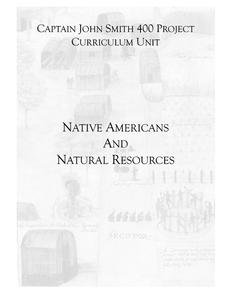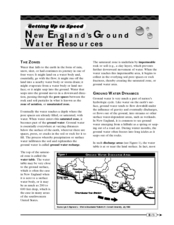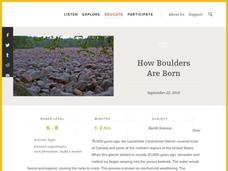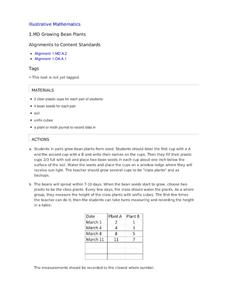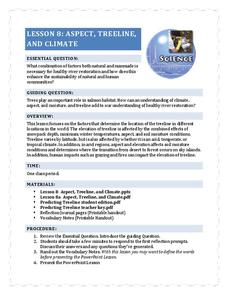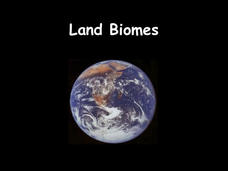Cal Recycle
Conserving Natural Resources
Trying to plan an engaging elementary science unit on natural resources? Conserve your energy! This five-part series of lessons and hands-on activities has exactly what you need to teach young scholars about the importance of conservation.
Curated OER
Native Americans and Natural Resources
North American Indian civilizations had already been in place for over 10,000 years before the arrival of European settlers. Introduce your young historians to Indian tribes that lived in the Chesapeake region in the early seventeenth...
Penguin Books
A Teacher's Guide to the Signet Classics Edition of Mark Twain's The Adventures of Huckleberry Finn
Whether new to teaching The Adventures of Huckleberry Finn or an experienced pro, you’ll find useful resources in this teacher’s guide. The 40-page packet includes background information, historical context, an annotated list of...
Forest Foundation
Forest Health
Young foresters examine the strategies, like prescribed burns and thinning, that are employed to ensure healthy forests.
Forest Foundation
The Nature of Trees
Young botanists examine the different parts of tress and then draw parallels between the functions of these parts and the function of parts of the human body.
K12 Reader
The Rock Cycle
This cross-curricular reading comprehension worksheet asks kids to read a passage of the rock cycle and then to use information in the article to respond to a series of questions.
Environmental Protection Agency (EPA)
New England's Ground Water Resources
Learn all about where ground water is stored, how it moves, and how it is accessed in a detailed and thorough 10-page reading. Whether supplementing reading for an existing environmental or earth science course or providing background...
Forest Foundation
Forest Watersheds
Where does the water we use come from? To understand the concept of a watershed, class members study the water cycle and then engage in an activity that simulates a watershed.
National Park Service
Living & Non-Living Interactions
What better way to learn about ecosystems than by getting outside and observing them first hand? Accompanying a field trip to a local park or outdoor space, this series of collaborative activities engages children in learning about the...
Science Friday
How Boulders Are Born
Want your class to rock? Then try this boulder activity. Pupils learn about a specific boulder field and use edible materials to demonstrate the geological processes that formed this unique feature. Weathering, erosion, and mass wasting...
Illustrative Mathematics
Growing Bean Plants
Plant growth experiments offer rich, cross-curricular learning opportunities that can really excite and engage young learners. In this series, children work in pairs planting, measuring, and comparing the height of bean plants in order...
Science & Plants for Schools
Photosynthesis - A Survival Guide
Young scientists learn what it takes for life on Earth to survive with this series of photosynthesis resources. Offering twelve different activities ranging from independent practice worksheets to in depth scientific experiments, this...
National Park Service
Aspect, Treeline, and Climate
Head to the treeline and beyond to examine how this feature of the landscape affects weather and climate, which gives scientists clues about its health. Class members' observations of photographs provide the data that drives the...
Wilderness Classroom
Pollution
Educate scholars on pollution—air, water, and land—with a series of lessons that begin with a thorough explanation of each type. Learners then take part in three activities to reinforce the importance of reducing pollution. They...
National Park Service
Erosion
A set of PowerPoint slides supports a lecture or class review of weathering and erosion. Viewers learn the definition of each and examine various photos for evidence. Erosion is further depicted as caused by wind, water, and ice....
US Environmental Protection Agency
Aquifer in a Cup
Young scientists create their very own aquifers in this science lesson on ground water. After learning about how some people get their drinking water from underground wells, young learners use sand, modeling clay, and aquarium rocks to...
National Wildlife Federation
Habitat Web
Young scientists weave together an understanding of ecosystems with this fun collaborative activity. Taking on the roles of different living and non-living elements of specific habitats, learners use a ball of yarn to create the web of...
Outside Education
Water Cycle Adventure
Evaporation, transpiration, condensation, precipitation, accumulation. Steam, clouds, rain, lakes. Guide your class members on an imaginary journey through the water cycle with a water cycle adventure script.
Teach Engineering
Extinction Prevention via Engineering
It's time to save endangered species through engineering. The third lesson in a nine-part Life Science unit has young environmentalists study species extinction. An engaging discussion leads to some ideas on how to use engineering design...
Biology Junction
Water Properties and More
Did you know many insects use cohesion or surface tension to walk on water? Using a presentation, scholars learn the more important properties of water. It extends into the concepts of solutions, suspensions, pH, and more.
Biology Junction
Origin of Life
Aristotle explained the idea of spontaneous generation, a concept which lasted almost 2,000 years before scientists proved it wrong. Scholars learn about the history of our understanding of the origins of life. They read examples of...
Biology Junction
Land Biomes
Biomes share similar climates and ecosystems, despite being separated geographically on the planet. A presentation introduces the six most common land biomes. It focuses on the commonalities in climate, plants, and animals with many...
American Museum of Natural History
What Do You Know About Archaeology?
A 10-question interactive permits young anthropologists to study the field of archaeology and the tools archaeologists use to dig into history.
NASA
Let's Investigate Mars
Take your science class on a hypothetical field trip to Mars with an engaging astronomy lesson. After first learning about NASA's Mars rover missions, young scientists plan their own scientific investigations of Earth's nearest neighbor.
Other popular searches
- Soil Erosion
- Soil Classification
- Soil Composition
- Soil Fertility
- Soil Conservation
- Soil Animals
- Rocks and Soils
- Soil Erosion Worksheets
- Elementary Science and Soil
- Soil Microbiology
- Plants and Soil Erosion
- Soil Management



